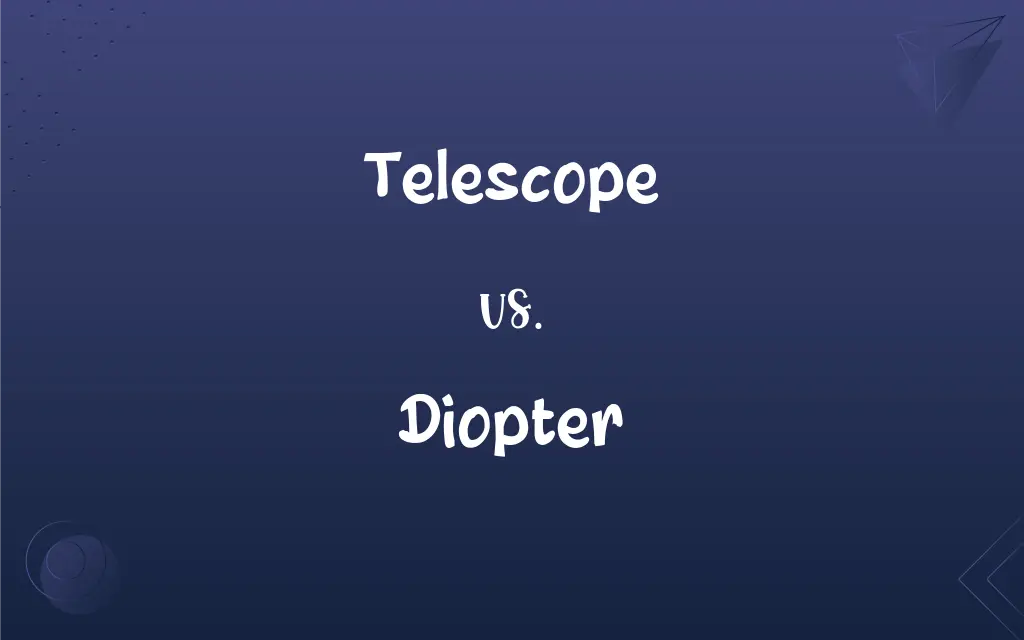Telescope vs. Diopter: What's the Difference?
Edited by Harlon Moss || By Janet White || Updated on September 24, 2023
A "Telescope" is an optical instrument used to observe distant objects, while a "Diopter" is a unit of measurement for optical power, typically of a lens. They differ in purpose, one being a tool for observation and the other being a unit of measurement.

Key Differences
A "Telescope" and a "Diopter" are fundamentally different concepts within the field of optics, serving distinct purposes. A Telescope is an optical instrument designed to magnify and observe distant objects by collecting electromagnetic radiation. It comes in various forms and sizes and is a crucial tool in astronomical studies, allowing scientists to study celestial bodies. In contrast, a Diopter is a unit of measurement used to express the optical power of a lens or mirror, and it plays a vital role in ophthalmology and optometry, indicating the refractive power of lenses.
The role of a Telescope is significantly different from that of a Diopter. A Telescope's primary role is to allow users to observe objects that are far away by gathering and focusing light, making it an invaluable tool for astronomers and researchers. The Diopter, however, is associated with measuring and categorizing the focusing power of lenses, used predominantly to correct vision impairments. It is a standard unit for defining the refractive power of lenses, and it aids in determining the appropriate corrective lenses for individuals with vision issues.
When delving into the utilization of Telescopes, one finds a broad range of applications, from exploring the universe and studying celestial bodies to terrestrial applications like bird watching and surveillance. They are complex instruments that can have multiple lenses and mirrors to enhance the view of distant objects. On the flip side, Diopters are integral in lens prescription, relating directly to the curvature of a lens. A lens with a higher diopter has more curvature and higher optical power, primarily used to correct the vision of individuals with myopia or hyperopia.
In summary, while the Telescope is an intricate optical instrument aimed at enabling the observation of distant objects, the Diopter is a unit that quantifies the optical power of a lens. Telescopes are synonymous with astronomical observations, providing insight into the cosmos, and Diopters are pivotal in the field of eye care, allowing for the precise prescription of lenses to correct vision abnormalities.
Comparison Chart
Purpose
Instrument for observing distant objects.
Unit of measurement for optical power of a lens.
ADVERTISEMENT
Field of Use
Astronomy, Surveillance, and Research.
Ophthalmology and Optometry.
Functionality
Gathers and focuses light to observe objects.
Measures the focusing power of lenses.
Complexity
Can be complex, involving multiple lenses and mirrors.
Relatively simple, representing a unit of measurement.
Application
Used for studying celestial bodies and terrestrial observation.
Used for prescribing corrective lenses.
Telescope and Diopter Definitions
Telescope
An instrument for collecting electromagnetic radiation.
The radio telescope detected signals from a distant galaxy.
ADVERTISEMENT
Diopter
A term indicating the refractive power of lenses.
The optometrist prescribed a +1.00 diopter lens for reading.
Telescope
A device using lenses or mirrors to magnify images.
The telescope provided a closer view of the moon.
Diopter
A value representing the reciprocal of the focal length in meters.
A lens with a focal length of one meter has a power of one diopter.
Telescope
An optical instrument for observing distant objects.
She gazed at the stars through the telescope.
Diopter
A unit measuring the optical power of a lens.
His left eye required a lens with a diopter of -2.50.
Telescope
An arrangement of lenses or mirrors or both that gathers light, permitting direct observation or photographic recording of distant objects.
Diopter
A parameter in lens prescription to correct vision.
She has a higher diopter in one eye due to astigmatism.
Telescope
Any of various devices, such as a radio telescope, used to detect and observe distant objects by their emission, absorption, or reflection of electromagnetic radiation.
Diopter
A standard unit in optics for vision correction.
People with myopia often have lenses with a negative diopter value.
Telescope
To cause to slide inward or outward in overlapping sections, as the cylindrical sections of a small hand telescope do.
Diopter
A unit of measurement of the refractive power of lenses equal to the reciprocal of the focal length measured in meters.
Telescope
To make more compact or concise; condense.
Diopter
A unit of measure of the power of a lens or mirror, equal to the reciprocal of its focal length in meters. Myopia is diagnosed and measured in diopters.
Telescope
To slide inward or outward in or as if in overlapping cylindrical sections
A camp bucket that telescopes into a disk.
Diopter
The dioptre adjustment mechanism of a pair of binoculars or of a camera viewfinder.
Telescope
A monocular optical instrument that magnifies distant objects, especially in astronomy.
Diopter
A lens element attached to the front of a photographic lens to shorten the lens's minimum focus distance; also called a "close-up filter".
Telescope
Any instrument used in astronomy for observing distant objects (such as a radio telescope).
Diopter
(obsolete) Any lens system, such as a telescope.
Telescope
(television) A retractable tubular support for lights.
Diopter
(obsolete) A theodolite or similar surveyor’s angle measuring device.
Telescope
(ambitransitive) To extend or contract in the manner of a telescope.
Diopter
(obsolete) An alidade.
Telescope
(ambitransitive) To slide or pass one within another, after the manner of the sections of a small telescope or spyglass.
Diopter
(obsolete) A surgical speculum.
Telescope
(intransitive) To come into collision, as railway cars, in such a manner that one runs into another.
Diopter
(obsolete) An instrument for drawing the skull by projections.
Telescope
To collapse, via cancellation.
Diopter
An optical instrument, invented by Hipparchus, for taking altitudes, leveling, etc.
Telescope
An optical instrument used in viewing distant objects, as the heavenly bodies.
Diopter
A unit of measurement of the refractive power of a lens which is equal to the reciprocal of the focal length measured in meters
Telescope
To slide or pass one within another, after the manner of the sections of a small telescope or spyglass; to come into collision, as railway cars, in such a manner that one runs into another; to become compressed in the manner of a telescope, due to a collision or other force.
Telescope
To cause to come into collision, so as to telescope.
Telescope
To shorten or abridge significantly; as, to telescope a whole semester's lectures into one week.
Telescope
Capable of being extended or compacted, like a telescope, by the sliding of joints or parts one within the other; telescopic; as, a telescope bag; telescope table, etc.; - now more commonly replaced by the term telescoping.
Telescope
A magnifier of images of distant objects
Telescope
Crush together or collapse;
In the accident, the cars telescoped
My hiking sticks telescope and can be put into the backpack
Telescope
Make smaller or shorter;
The novel was telescoped into a short play
Telescope
A tool for astronomical studies and observations.
The Hubble Space Telescope has captured stunning images of the universe.
Telescope
A device with variable magnification for terrestrial and celestial observation.
Birdwatchers often use a telescope to observe birds in detail.
FAQs
What is the main use of a telescope?
The main use of a telescope is to observe distant objects by magnifying their images.
Can telescopes detect electromagnetic radiation other than visible light?
Yes, some telescopes, like radio telescopes, can detect different types of electromagnetic radiation.
Can telescopes be used for terrestrial observation?
Yes, some telescopes are designed for both celestial and terrestrial observations.
Can telescopes be used by amateur astronomers?
Absolutely, telescopes are widely used by both professional and amateur astronomers.
Are there different types of telescopes?
Yes, there are several types of telescopes, including refracting, reflecting, and catadioptric telescopes.
Is a diopter a unit of measurement?
Yes, a diopter is a unit of measurement for the optical power of a lens.
What does a higher diopter value indicate?
A higher diopter value indicates a greater curvature of the lens and higher optical power.
Is diopter used in prescribing reading glasses?
Yes, diopters are used to determine the optical power needed for reading glasses.
Can a lens have a negative diopter value?
Yes, negative diopter values are used for lenses that correct myopia (nearsightedness).
Can telescopes magnify images of celestial bodies?
Yes, telescopes are specifically designed to magnify images of celestial bodies.
Is diopter important for people with vision impairments?
Absolutely, diopter values are crucial for prescribing the correct lenses to people with vision impairments.
How is diopter related to the focal length of a lens?
Diopter is the reciprocal of the focal length in meters.
Is a telescope an optical instrument?
Yes, a telescope is an optical instrument designed to collect and focus light.
What is the significance of diopter in optometry?
Diopter is significant in optometry for determining the optical power of corrective lenses.
Are telescopes important for astronomical research?
Yes, telescopes are fundamental tools for astronomical research, enabling the study of distant celestial objects.
About Author
Written by
Janet WhiteJanet White has been an esteemed writer and blogger for Difference Wiki. Holding a Master's degree in Science and Medical Journalism from the prestigious Boston University, she has consistently demonstrated her expertise and passion for her field. When she's not immersed in her work, Janet relishes her time exercising, delving into a good book, and cherishing moments with friends and family.
Edited by
Harlon MossHarlon is a seasoned quality moderator and accomplished content writer for Difference Wiki. An alumnus of the prestigious University of California, he earned his degree in Computer Science. Leveraging his academic background, Harlon brings a meticulous and informed perspective to his work, ensuring content accuracy and excellence.































































